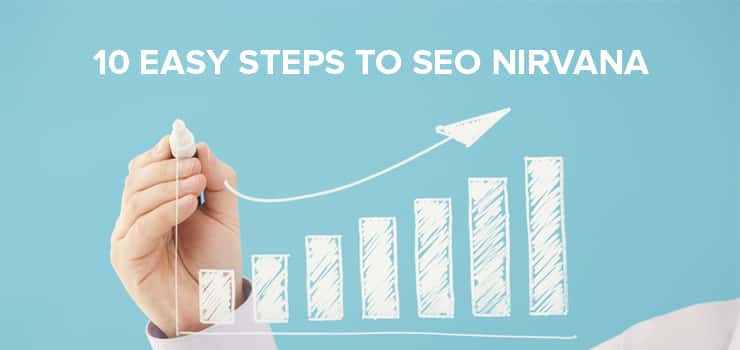Today we’re talking search engine optimization . But not just old school “let’s optimize our website for keywords” SEO (the days of keyword stuffing are o-v-e-r). Meta keywords used to be what all the cool kids relied on for greater search engine rankings. Not anymore. Not in the NEW online economy.
Visuals, social-sharing buttons, quality outbound links and fresh content play a vital role in search engine marketing in 2015 and beyond. How so? Read on to discover how these and a few other SEO-friendly practices can catapult your website or blog into search engine nirvana.
Top 10 SEO steps your site needs right now
1. Choose SEO-friendly permalinks.
Did you know that a URL is one of the first things a search engine uses to determine page rank?That’s why it’s imperative to make your URLs super easy to crawl.Since the first three to five words in the URL are “weighted” the most, your web page’s URL should be brief, concise and keyword-rich.Keeping URLs short is also beneficial for user experience, alignment to the page’s topic and keyword, and categorizing your site pages.
2. Leverage visuals.
You can easily give search engines more opportunities to link to your website by adding keywords in the image alt text and file name. Striking infographics, videos and photos all have the “stickiness” factor, encouraging your visitors to stick around longer and helping to reduce bounce rates. These are two vital factors for interaction-based ranking.
3. Start your title tag with a keyword.
Simply place your primary keyword at the very beginning of your title tag.
What is a title tag? A title tag is used by search engines to display a page in search results. It can also be found at the top of your browser. Title tags communicate to search engine robots and searchers what the page is about, providing a brief, convenient headline to describe the page when it appears in search results.
Something to remember: Google will only display between 50-60 characters in the title tag. So you should keep title tags under 55 characters and rely on riveting, mouthwatering copy to try to entice readers to click.
When crafting title tags, make sure to avoid generic, vague terms like “services,” “home” or “products.”
4. Wrap your blog article or web page heading in an h1 “heading” tag.
By using < H1 >, < H2 > and < H3 > tags, you help to tell a search engine the level of importance of the content. You can check your site’s current heading tags by viewing it in HTML view.
5. Use your primary keyword in the first 100-150 words of your article.
In addition to using your primary keyword at the beginning of your title tag, make sure to also include it close to the beginning of your blog article. This underscores your web page’s relevancy to that keyword.
As I mentioned earlier, the days of keyword “stuffing” are done, but you still need to keep your site pages optimized around one central theme and key phrase. Keywords should appear in important on-page elements:the page title, heading, image alt text, and naturally throughout the page copy. The vital thing to remember is to write each of these items for humans, not robots.
6. Use outbound links to sites related to yours.
How do you make sure your website or blog is never devalued and ensure targeted visitors to your site? Quality outbound links.
Outbound links are links that direct a web visitor to some other domain from your site. When you link out to related domains, it serves as a relevancy flag to Google, helping it identify your topic and understand your niche.But, providing links to useful outside content also helps to build the trust, authority and credibility of your site in the eyes of your audience.Good links equal good reputation.
Here’s some advice to get you started:
- Link to web pages that offer a credible, authoritative view on the topic and that will provide real value to your readers.
- Link to successful brands that already have a strong following, positive image and respectable PR.
- Link to the bloggers in your network, niche or micro niche, helping you to create a sense of community with fellow bloggers.
To maintain a positive user experience, keep outbound links to a minimum. An overabundance of links can be annoying or obnoxious to your readers.
7. Speed matters.
Who wants to wait around for a sluggish web page to load? Boost page load speed by switching to a faster hosting company.
Site speed does matter in search rankings, and now more than ever there is an emphasis on user experience.Site speed is and will continue to be a critical ranking factor for search engines. In the new online economy,users are becoming more and more demanding of fast load times, which means your site will be left behind if it makes a user wait too long.
If you’re concerned with your website’s speed, test it using an online website speed measurement tool. Also, talk to your website hosting company and make sure their servers can handle the size of your company and its website needs.
Here are a few other offenders that can cause slower page load speed:
- Embedded videos
- Using lots of images or plugins
- Images that are not compressed before uploading
- Heavy coding
8. Add modifiers to your title.
Examples include: cheap, 2015, best, new, latest, buy. You can also use geographical modifiers (Chicago, southeast, North Carolina) for more targeted traffic.
9. Use social-sharing buttons, such as Facebook, Pinterest, LinkedIn, etc.
Give your audience a chance to re-post, tweet and share your content with the world. Social sharing is quickly gaining traction as a super-charged ranking factor.
In SEO, your ultimate goal is to improve your rank in the search engines, and in order to do so, you need links. Social media is your linking fire starter. Here’s how it works:
Social sharing directly increases the visibility of a page and, in effect, the opportunity to obtain more links. That increased visibility means it may get noticed by a web viewer with their own web presence, such as a blogger, brand, business owner, journalist or author. That viewer may then mention it in one of their upcoming posts or articles. If they link to it, BAM! Your page is more likely to rank.
But remember, to get viewers to link to your content, it must first be great, useful and unique, which brings us to big tip #10…
10. Post long content:
In a serpIQ analysis of high ranking pages, they uncovered that more content correlates with higher rankings. (Source )
Aim for around 1500 words.But don’t just ramble to reach 1500 words. Keep your content natural, engaging and conversational – not overly stuffed with keywords and random filler content. You can’t publish pitiful content and expect your rankings or conversions to go up. Great content gets shared, tweeted and liked, leading to conversions and higher rankings.And by all means, write for real people – not search engines.
How many of these tactics are you already doing? SEO will continue to evolve, no doubt. But by following these ten parameters, you’ll be well on your way to having a more SEO-friendly, click-worthy and top ranking website. Stay tuned for more on how social search, social signals and other social factors are increasingly affecting search engine rankings.
Bonus SEO tip
SEO tips
For today’s bonus tip:
Give each page a unique page title and avoid duplicate content
Place specific keywords in the title tag for each page based on the unique content of that page. This practice will make your individual pages easier for search engines to categorize.Also, multiple pages with the same content “confuse” a search engine, resulting in lower ranking and loss of traffic, so make sure to avoid duplicating content.
Are you looking for an SEO solutions partner?
SEO solutions partner
Still confused? If you’re looking to secure your website’s place in SEO nirvana, we can help get you there.
SEO is one of the hallmarks of our business. Our search engine marketers are top notch and leave no stone unturned when it comes to search engine strategy.Sure you can implement all of the tactics that we’ve explored here in this article. But, if the DIY thing just isn’t your style or your simply don’t know where to start, let us optimize your website for better search engine rankings for you.We’re your SEO linchpin! By letting us lead the way, you can bypass all of the confusion and go straight to the highest level of results. Click here and we’ll hit the ground running starting today.
Until next time, here’s to your massive online success!



